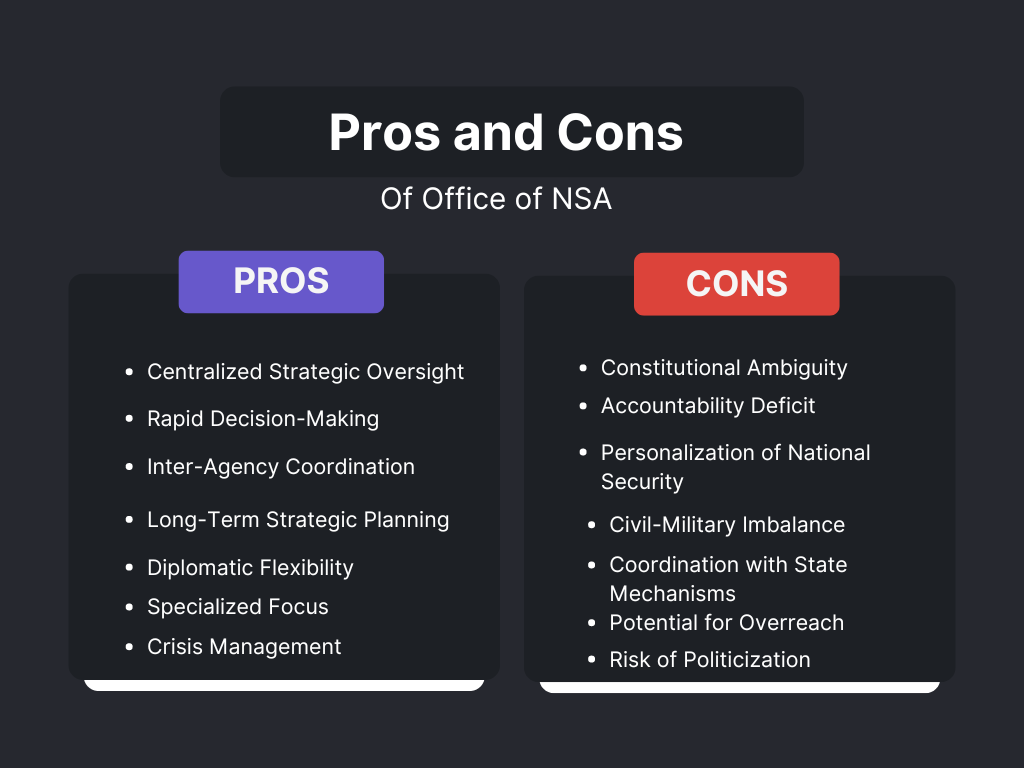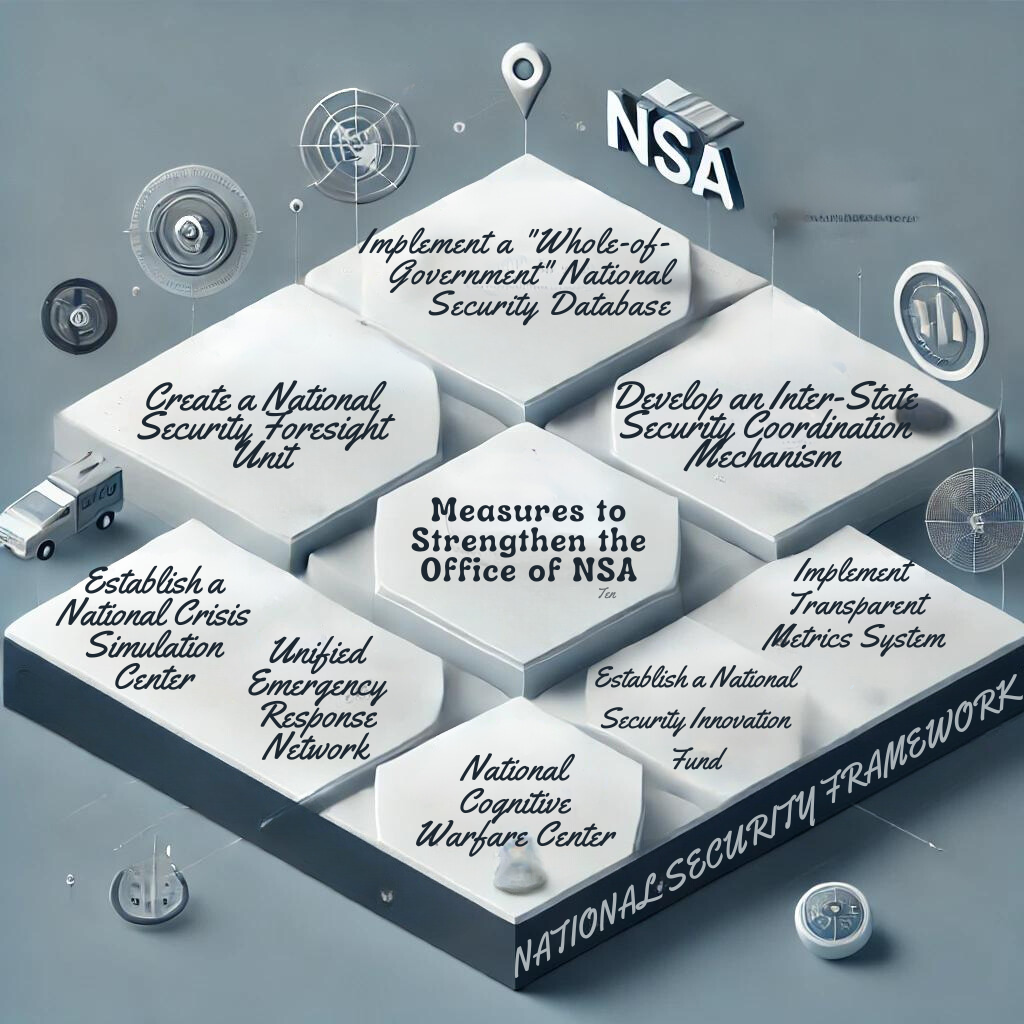The recent appointment of an Additional National Security Advisor (ANSA) has sparked discussions about the evolving role and responsibilities of India’s National Security Advisor (NSA). This shift towards a more advisory role rather than an operational one has raised important questions about the balance between internal and external security, and the coordination of intelligence. As India faces growing security challenges, it is crucial to reassess and reform the national security framework.
The NSA’s role in India includes strategic advisory functions, crisis management, diplomatic engagements, and ensuring inter-agency coordination. This position is pivotal in addressing major security challenges like cyber warfare, cross-border terrorism, and maritime threats. However, concerns such as constitutional ambiguity and accountability deficits need to be addressed to enhance the effectiveness of the office. Strengthening the national security framework through measures like establishing a unified emergency response network and creating a national security innovation fund can significantly bolster India’s security apparatus.
Origin of the Article
This editorial is based on “What it means—and could mean — to be India’s National Security Advisor” which was published in The Indian Express on 08/07/2024. The article discusses the evolving role and challenges of the NSA in India.
Relevancy for UPSC Students
Understanding the role and challenges of the NSA is crucial for UPSC students as it touches upon various aspects of the GS Paper 2 and GS Paper 3 syllabi. It aids in grasping the nuances of India’s security framework, government policies, and the functioning of security agencies, which are essential for both prelims and mains.

Why in News
The recent appointment of a new Additional National Security Advisor (ANSA) and the restructuring of India’s national security apparatus have highlighted the evolving role of the National Security Advisor (NSA). This development is crucial for UPSC aspirants as it raises pertinent questions about India’s security framework, internal-external security balance, and intelligence coordination—all frequent themes in both Prelims and Mains, reflecting the dynamic nature of national security challenges.
Major Functions of the Office of NSA in India
The National Security Advisor (NSA) in India plays a pivotal role in shaping the nation’s security policies and strategies. This office is crucial in providing strategic counsel, coordinating intelligence, managing crises, and engaging in high-level diplomatic negotiations to safeguard national interests.
Strategic Advisory Function
The NSA provides comprehensive strategic counsel on domestic, foreign, and defense policies. This role involves offering in-depth analysis and insights on complex security and intelligence issues. By advising the Prime Minister, the NSA ensures that decisions are well-informed and strategically sound, addressing the multifaceted nature of national security.
Coordination and Integration
The NSA ensures synergy among various ministries and security agencies by coordinating intelligence reports from different sources. This includes agencies like R&AW, IB, NTRO, MI, DIA, and NIA. Effective coordination helps in formulating cohesive security policies and actions, thereby enhancing the overall security architecture.
Crisis Management and Response
In times of national security emergencies, the NSA leads crisis management efforts. This involves overseeing the implementation of crisis response strategies and ensuring timely and effective actions to mitigate threats. The NSA’s role in crisis management is crucial for maintaining stability and security during emergencies.
Diplomatic Engagement and Negotiations
The NSA participates in high-level diplomatic negotiations on security matters, engages in track-two diplomacy for sensitive international issues, and represents India in international security forums and bilateral security dialogues. This diplomatic engagement helps in addressing global security challenges and fostering international cooperation.
Institutional Leadership
The NSA acts as the secretary of the National Security Council, which is headed by the Prime Minister. This role entails providing strategic leadership and ensuring that the council’s deliberations are aligned with national security objectives. The NSA’s leadership is integral to the council’s effectiveness in addressing security issues.
Advantages and Concerns Related to the Office of NSA
The office of the NSA offers significant advantages in enhancing national security but also raises concerns regarding constitutional ambiguity, accountability, and potential overreach. Balancing these aspects is crucial for effective governance and security management.

Advantages
- Centralized Strategic Oversight: The NSA provides a holistic approach to complex security challenges, ensuring comprehensive analysis and strategic planning.
- Rapid Decision-Making: Direct access to the Prime Minister enables swift actions during crises, enhancing response efficiency.
- Inter-Agency Coordination: The NSA bridges gaps between security and intelligence agencies, fostering cohesive efforts.
- Long-Term Strategic Planning: The NSA focuses on foresight and long-term strategies, ensuring preparedness for future challenges.
- Diplomatic Flexibility: The NSA enables discreet, high-level diplomacy for sensitive negotiations, enhancing international relations.
- Specialized Focus: Dedicated attention to national security matters ensures thorough and specialized handling of issues.
- Crisis Management: The NSA is equipped to handle and coordinate responses to national crises, ensuring effective mitigation.
Concerns
- Constitutional Ambiguity: The NSA’s role lacks explicit constitutional backing, raising questions about its legitimacy and scope.
- Accountability Deficit: The NSA is not directly answerable to Parliament, leading to transparency concerns.
- Personalization of National Security: Policies may be overly influenced by the incumbent’s personal views, affecting objectivity.
- Civil-Military Imbalance: The NSA’s role can disrupt the delicate balance between civilian and military relations.
- Coordination with State Mechanisms: The NSA’s ill-defined role in the federal structure can lead to conflicts with state mechanisms.
- Potential for Overreach: The broad mandate of the NSA may lead to encroachment into other ministries’ domains.
- Risk of Politicization: Close association with the Prime Minister’s office may politicize security decisions, affecting impartiality.
PESTEL Analysis
| Political: The NSA’s role is politically significant, directly advising the Prime Minister on security matters. The centralized oversight and rapid decision-making capabilities are politically advantageous, enhancing national security. However, the lack of explicit constitutional backing and accountability deficit raises concerns about transparency and potential overreach. Economic: Effective national security, led by the NSA, ensures a stable environment for economic growth. Investments in technologies and crisis management strategies can safeguard against economic disruptions caused by security threats. However, the costs associated with developing advanced security infrastructure and maintaining high-level intelligence operations are substantial. Social: The NSA addresses critical social challenges, including cyber warfare, terrorism, and misinformation. Ensuring social cohesion and public safety are paramount. However, the risk of politicization and potential civil-military imbalance could impact public trust and societal stability. Technological: The NSA plays a vital role in countering cyber threats and enhancing cyber defense capabilities. Investment in space security, maritime technology, and cognitive warfare underscores the importance of technological advancements in national security. Establishing a National Security Innovation Fund and a National Crisis Simulation Center can foster technological innovation. Environmental: Environmental factors such as climate change can exacerbate security threats, including resource conflicts and natural disasters. The NSA must consider environmental implications in strategic planning and crisis management. Legal: The legal ambiguity surrounding the NSA’s role necessitates clearer definitions and accountability measures. Developing a transparent metrics system for national security outcomes can enhance legal clarity and public trust. |
Major Security Challenges that Necessitate Having an Office of NSA in India
India faces a myriad of security threats, from cyber warfare to cross-border terrorism, necessitating a robust Office of the NSA to address these multifaceted challenges effectively.
Cyber Warfare and Digital Threats
State-sponsored cyber attacks targeting critical infrastructure pose significant threats to national security. The 2020 Mumbai power outage, suspected to be caused by Chinese cyber attacks, highlights the vulnerability of India’s infrastructure to digital threats. Ensuring cybersecurity is a key responsibility of the NSA.
Cross-Border Terrorism and Radicalization
The rise of lone-wolf attacks inspired by global extremist ideologies, bioterrorism, and the use of emerging technologies like drones by terrorist groups amplify the complexity of counter-terrorism efforts. The recent terrorist attack in Reasi underscores the persistent and evolving threat of terrorism.
Border Disputes and Regional Instability
India faces ongoing tensions along the Line of Actual Control with China, exemplified by the 2020 Galwan Valley clash. Instability in neighboring countries like Afghanistan and Myanmar poses risks of spillover effects, including refugee crises and increased terrorist activities, necessitating robust border and regional security measures.
Space and Satellite Security
India’s reliance on space technology for communication, navigation, and surveillance makes satellite infrastructure a critical security concern. Threats from space debris and the potential militarization of space, as demonstrated by China’s 2007 anti-satellite test, present new challenges for space security.
Maritime and Oceanic Threats
Challenges in the Indian Ocean, including piracy, terrorism, and fishing area conflicts, are compounded by the expansion of China’s naval presence, such as at Hambantota Port in Sri Lanka. Addressing these maritime threats is crucial for safeguarding India’s maritime interests.
Information Warfare and Social Media Manipulation
The weaponization of information through social media and the rise of deepfake technology threaten social cohesion and democratic processes. Ensuring the integrity of information and countering misinformation are vital tasks for national security.
Measures to Strengthen the Office of NSA and National Security Framework in India
Enhancing the Office of the NSA and the national security framework requires comprehensive reforms and innovative measures to address evolving security challenges effectively.

Implement a “Whole-of-Government” National Security Database
Develop a secure, centralized digital platform that integrates real-time information from various ministries, intelligence agencies, and military branches. This system would provide the NSA and key decision-makers with a comprehensive, up-to-date view of national security issues and opportunities.
Create a National Security Foresight Unit
Establish a dedicated team within the NSA’s office focused on long-term strategic planning and scenario analysis. This unit would regularly produce reports on potential future security challenges and opportunities, shaping proactive policies.
Develop an Inter-State Security Coordination Mechanism
Establish a formal structure under the NSA for regular consultation and coordination with state-level security officials. This would improve information sharing and policy implementation across federal and state levels, particularly for issues like border security and counter-terrorism.
Implement a Transparent Metrics System
Develop a set of key performance indicators for national security outcomes, which would be regularly reviewed and reported securely to relevant government stakeholders. This would enhance accountability and provide a basis for continuous improvement in national security management.
Establish a National Crisis Simulation Center
Build a state-of-the-art facility for conducting regular, large-scale simulations of various security scenarios. This center would allow policymakers, military leaders, and key stakeholders to practice coordinated responses to complex crises, improving overall preparedness and identifying gaps in the current security framework.
Establish a National Security Innovation Fund
Set up a dedicated fund to invest in cutting-edge research and development of technologies crucial for national security. This fund would support projects in areas such as quantum computing, advanced materials, autonomous systems, and space-based technologies, ensuring India stays at the forefront of technological advancements relevant to security.
Develop a Unified Emergency Response Network
Create an integrated platform that connects all emergency services, including police, fire, medical, and disaster response teams across the country. This network would enable rapid, coordinated responses to both localized incidents and large-scale emergencies, improving overall national resilience.
Establish a National Cognitive Warfare Center
Create a specialized institution to counter and develop capabilities in cognitive warfare, focusing on protecting India’s information space and societal cohesion. This center would combine expertise in psychology, data science, and strategic communications to defend against and potentially engage in influence operations, disinformation campaigns, and other forms of cognitive manipulation.
Conclusion
The evolving role of the National Security Advisor in India underscores the need for a dynamic and multifaceted security framework. As future civil servants, understanding these complexities equips you to contribute effectively to national security. Embracing innovative strategies and ensuring robust coordination will be vital in addressing the diverse challenges that lie ahead. Stay informed, and prepared.
| UPSC Civil Services Examination, Previous Year Questions (PYQs) Mains Q. Considering the threats cyberspace poses for the country, India needs a “Digital Armed Force” to prevent crimes. Critically evaluate the National Cyber Security Policy, 2013, outlining the challenges perceived in its effective implementation (GS Paper III, 2022). Q. Critically examine the evolving role of the National Security Advisor (NSA) in India in the context of recent organizational restructuring. What are the major concerns related to the office of NSA, and how can these be addressed to strengthen national security? |

